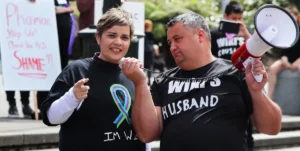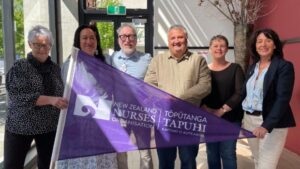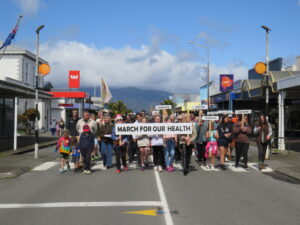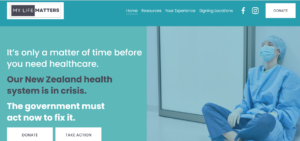I chair Patient Voice Aotearoa (PVA).
We were established as a charitable trust in 2019, a year following the diagnosis of my late wife Wiki with advanced breast cancer. Our focus has been on having the Government fund Pharmac significantly better and to reform the agency. We’ve had some wins, but change is sluggish and there is still so much to be done. As was the case with my late wife, fate would see me involved in another public campaign to improve health services in Aotearoa.

In August this year, I received a phone call from a relative in Westport to say that my father was seriously ill at Greymouth Hospital, otherwise known as Te Nīkau, and for me to travel quickly to his bedside. As I spent weeks watching him recuperate in Christchurch Hospital, and then at home in Seddonville, a small settlement 50km north of Westport where my father still lives on a five-acre block and where I was raised, I saw for myself the sad state of healthcare in the Buller.
What was first brought to my attention by family and friends was the unfortunate death of a 51-year-old Filipino man, Leonides Lozano.
What was first brought to my attention by family and friends was the unfortunate death of a 51-year-old Filipino man, Leonides Lozano. Lozano had been misdiagnosed with a stomach ulcer at Te Rau Kawakawa, still known by locals as Buller Hospital, when in fact he eventually suffered an aortic dissection and died on being returned to the facility on the same day. For some unknown reason, Hato Hone St John and the local volunteer fire brigade had been called when Lozano had been transported back to the hospital and pronounced dead. His case is now the subject of a serious incident review, but for reasons only known to Health New Zealand, they took over three months to inform his wife, Licelie, that his death was being investigated.

Despite nurses and staff at Buller Hospital being instructed by management not to speak about the case, some locals understand that the hospital was overrun that particular day with only one doctor serving the needs of the entire community. Of major concern to the locals is the inability by Health New Zealand West Coast to staff Buller Hospital since the new facility opened its doors in May last year. Due to doctor and nurse shortages, the hospital has been shut for just under a month since it opened.
Patients unable to access the building’s ASU (acute stabilisation unit), have to rely on the sole ambulance that services the entire Buller region with vehicle and staff often not in Westport as it is called to transfer patients to Greymouth Hospital that is an hour’s drive away. The rescue helicopter is stationed in Greymouth, so again patients in an emergency must wait for the helicopter to arrive, weather permitting.

My father has himself been transferred from Buller Hospital to Greymouth, as one weekend when he was admitted to the hospital, authorities had to shut the doors due to their not being enough nurses. In another case of substandard care in Buller, Dad, like many others living in the Buller, very rarely if ever, sees the same doctor more than once. Continuity of care appears to be a distant dream for many patients living in Buller.
Concerns that we had experienced as a family are definitely held by the wider community and so I launched a petition that asks the Government to urgently address staffing shortages that are affecting the delivery of health services to the community of Buller by Health New Zealand West Coast. That petition gained over 3000 signatures and was delivered by my father and I to Labour’s Dr Ayesha Verrall on the steps of Parliament. 
During the petition, I met Anita Halsall-Quinlan. Anita is a former board member of the now defunct West Coast District Health Board and led the charge for a fit-for-purpose hospital to be built for Buller in 2018. A discussion ensued about organising a larger protest in Westport about healthcare in Buller, following a decision by the West Coast Primary Health Organisation to shut all urgent and after-hours GP practices throughout the wider West Coast region. The face-to-face service was to be replaced with telehealth, with many people wondering how their temperature or blood pressure would be taken.
Intensifying a reluctance by the community to accept the change in service is that the West Coast has an older than average population in comparison with the rest of the country, less people have access to the internet, and cell phone reception is intermittent in many locations. Despite these concerns, West Coast Health pushed ahead with the changes at the beginning of October without many in the community having received any information about how to engage with the new telehealth service. The rollout was rushed, ill-communicated and with little to no time to be socialised within the community. It would be later revealed that discussions to replace the clinics with telehealth had begun as early as January this year.

Again, frustrated with the actions of health officials, the Buller Health Action Group with support from Patient Voice Aotearoa, organised a protest in the form of a silent march that would take place from Westport’s Victoria Square to the town’s clock tower at the municipal chambers. The people of Buller came in their hundreds, as both young and old told the Government that their local health system falls well below their expectations. In total some 2000 people filled Palmerston Street, the main throughfare in Westport.
Before the protest, and with the media spotlight being on the poor state of healthcare in Buller, I received calls from other rural locations around the country including Kaitaia, Hawera, Masterton and Oamaru, with distressed medical staff telling me the situation was no different in their neck of the woods. With that in mind, PVA announced The Buller Declaration on the State of the New Zealand Health System at the silent march. The declaration reads as follows:
- Aotearoa New Zealand’s health system is in a state of crisis.
- The Government must act urgently to address that crisis.
- Rural, Māori, and low-income populations are disproportionately affected by the crisis.
- The Government must act urgently to meet its obligations under Te Tiriti o Waitangi and protect Māori health, in consultation with iwi and hapū.
- The Government must allocate additional resources to train, recruit, and retain more nurses, doctors and specialists.
Kerri Nuku from the New Zealand Nurses Organisation, Sarah Dalton from the Association for Salaried Medical Specialists, Dr Jeremy Webber from the Hauora Taiwhenua Rural Health Network, Dr Andrew Laurenson from the Royal New Zealand College of General Practitioners, Anita Halsall-Quinlan from the Buller Health Action Group, and myself on behalf of Patient Voice Aotearoa, signed the Declaration before inviting the Buller public to come and place their signature on the Declaration. Copies of the Declaration were then taken on a South Island roadshow to Invercargill, Dunedin, Oamaru, Timaru, Ashburton, Blenheim, Greymouth and Hokitika, to be signed by the public.
Places where the public can sign the Declaration can be found at www.mylifematters.org.nz
Places where the public can sign the Declaration can be found at www.mylifematters.org.nz A copy will be delivered to Nelson by the end of year, before copies will be left in North Island communities starting from next year. Once we gather enough signatures, the declaration will then be taken to Parliament. My plea to the 66,000 strong nurse workforce is for everybody to visit the website and go to the locations around the country to sign the declaration. Anybody from any age can sign and everybody is invited to help us deliver the petition when the time comes. 
My final message to you, our nurses, is that patients have the utmost respect for the work that you do, and heartfelt sympathy for the system in which you find yourself in. When the health system fails, as is happening more and more, patients don’t blame nurses or doctors but place the blame fairly on the shoulders of a system in freefall, a system that was created by successive governments. We hope, like you, that we can deliver a strong message to those in power with the Declaration, that the New Zealand healthcare system is sick and in urgent need of care. Only then, might we begin to address the multitude of problems that plague our health system.





